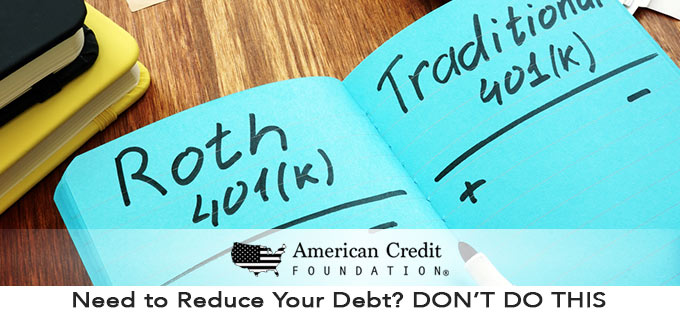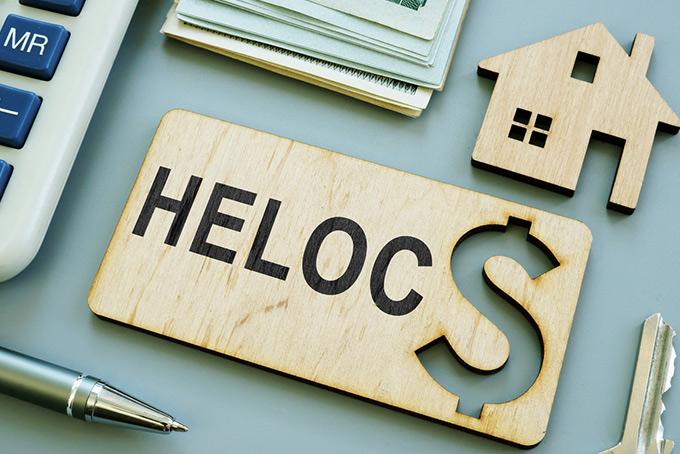
Need to reduce your debt? Don’t do this: We talk a lot about debt – particularly getting out of debt. And while we cover a lot of strategies that help many people dig out of a financial hole, it’s time for a frank discussion about a few schemes that don’t work for a lot of folks.
We’re all for simple solutions. If you’re already struggling under the stress of financial insecurity, there’s no point in adding a complicated budgeting process. But don’t fall victim to get-rich-quick schemes or over-simplified approaches with exaggerated claims. Ask yourself, “Does this sound too good to be true?” Trust your instinct – after all, it’s your money, and you need to be comfortable with your financial strategy.
Before you launch any debt reduction strategy, keep in mind that the first thing you need to do is assess the cause of your financial problems. Even the best-laid plans can only help if you’re willing to change how you manage your money.
Risky Method #1: Borrowing From Your 401(k)
Sure, when you’re young, retirement seems like it’s ages away. You look at that nest egg and think, “I need that money now! And I have loads of time to make it up.” But this strategy is clearly a lose-lose. The biggest benefit of your 401(k) is time – you’re stashing cash away today to save for tomorrow, and that cash is building upon itself with compound interest. If you make an early withdrawal to pay off loans, you’ll accrue less interest and hence have less to cover you in your twilight years. What’s worse, early withdrawal incurs penalties, fees, and taxes.
Bottom line: Never borrow from your 401(k) to pay off your debt. Period.
Risky Method #2: Home Equity Line of Credit
A home equity line of credit (or HELOC) is a second mortgage that gives you access to funds based on the value of your home. As the name suggests, it allows you to borrow against your equity, which is your home’s value minus the amount you still owe on your mortgage. True, a HELOC can be a source of quick cash with a lower interest rate than, say, credit cards or personal loans. You typically have the option to repay it all at once or in monthly installments like a credit card. But opening a HELOC requires some high up-front costs that may not be worth it. And think of the repercussions of borrowing money against your home: You risk foreclosure and losing your house if you can’t pay back the loan.

Bottom line: Limit this strategy to funding improvements that increase the value of your home – if you can truly afford it.
Risky Method #3: Debt Consolidation
Consolidating your debt essentially involves combining all your debts into a single payment. For folks with many different payments throughout the month, this is an appealing method to simplify bills. If simplifying bills is your main goal, this might be the route for you. But if you’re looking for a method to reduce your debt, consolidation could do just the opposite: You could end up with more debt than you started with. That’s because by extending your loan term, you might negotiate a lower monthly payment – but in the long run, you may end up paying more in interest. Also, the lifespan of your loans typically increases when you consolidate, keeping you in debt even longer.
Bottom line: This strategy is only valuable if you prefer convenience over brevity, and can qualify for the loan.
Risky Method #4: Debt Settlement
Ever hear the claim that XYZ Debt Settlement Company can reduce your debt by 50% and get you out of debt in 36 months? Wow, what indebted soul wouldn’t want to believe this? But here’s a real too-good-to-be-true statement: These companies charge you a fee – and a hefty one, at that! – in exchange for negotiating with creditors on your behalf to reduce what you owe. Many consumers using these services have been left high-and-dry. And even those “scrupulous” debt settlement companies charge exorbitant fees. You’ll face a setup charge, a monthly “retainer,” and then a whopping fee when your debt settles, either based on your debt balance when you enrolled in the program or based on the amount of debt the settlement eliminated.
Several reputable national consumer advocates – including the National Consumer Law Center, the Consumer Financial Protection Bureau, and the Center for Responsible Lending – strongly urge exploring literally any other option first because working with debt settlement companies is rarely worthwhile – and might even get you into deeper financial trouble.
Bottom line: Debt settlement should be the last resort. The absolute final resort.
If you need to reduce your debt, check out our free consultation form HERE:
Keep in mind, though, that financial decisions are very personal. If you’ve had success with any of these risky strategies, by all means, continue what you’re doing. But if you’ve started down one of these paths and find that you’re floundering, contact American Credit Foundation today. One of our friendly financial experts will work with you to figure out the strategy that will help.